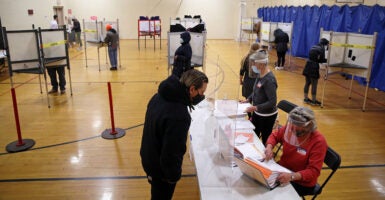Election legislation sponsored by Arizona state Sen. Michelle Ugenti-Rita, who represents eastern Maricopa County, failed Thursday after state Sen. Kelly Townsend, a fellow Republican, changed her vote to no. Townsend represents portions of Maricopa and Pinal counties.
Ugenti-Rita joins “The Daily Signal Podcast” to discuss the bill, how its defeat hurts Arizonans, and whether lawmakers will hold another vote on the legislation.
We also cover these stories:
- The Supreme Court will argue a Second Amendment case in coming months.
- Conservative justices on the high court signal support for two nonprofits’ challenge of a California law requiring them to disclose the identities of large donors.
- The Supreme Court declines to hear arguments in a case involving Texas and California.
“The Daily Signal Podcast” is available on Ricochet, Apple Podcasts, Pippa, Google Play, and Stitcher. All of our podcasts can be found at DailySignal.com/podcasts. If you like what you hear, please leave a review. You also can write to us at [email protected].
Rachel del Guidice: We are joined today on “The Daily Signal Podcast” by Arizona state Sen. Michelle Ugenti-Rita. Sen. Ugenti-Rita, it’s great to have you on “The Daily Signal Podcast.”
State Sen. Michelle Ugenti-Rita: Happy to be here. Thank you.
Del Guidice: Well, thanks for making the time. We appreciate it. So, Arizona’s election bill failed in the Arizona Senate on Thursday after one Republican changed her vote. … I want to get to what happened, but can you start off just by telling us about this election bill?
Ugenti-Rita: Absolutely. I love this bill, so happy to. So this is, I would say, a modest but significant reform. It addresses what’s currently called PEVL, that’s the acronym, the Permanent Early Voting List. It’s the list voters need to be on if they want to receive their ballot by mail.
So if you want to vote by mail in Arizona, it’s a voluntary program that we offer, you have to elect to put your name and request that your name be put on the Early Voting List. We don’t send out ballots automatically. But once you’re on that list in Arizona, in very, very few circumstances can you ever be removed.
So what my bill was doing, it was going to say, if you miss any election over the course of two election cycles—so that’s one election cycle, which is a two-year period, primary, general, and then another election cycle—if you miss those elections in a row, so consecutive, in two election cycles, we’re going to send you a notice.
The county is going to send you a notice and say, “Hey, non-voter, non-mail-in voter, are you there? Do you still want to participate via mail? Let us know. Please sign this form so we know that you’re there and then we’ll continue to send out ballots to your home.”
If you sign it, great, you’ll continue to be reauthorized in the program. You’ll get a ballot by mail. If you don’t sign it, you will be removed. And then, of course, if you wanted to sign up later, you can. You can always go vote in person, but you would be removed for that mail-in list.
That’s what the bill does, cleans up our voter rolls, our mail-in voter rolls. Real simple, but important. And yes, what you said earlier is true, the bill did die on final read in the Senate by one vote, and then, of course, so that it failed to reach a majority vote, and has not advanced to the governor’s desk.
Del Guidice: Can you pull us more into what happened? This was a Republican state senator, Sen. Kelly Townsend, who last minute changed her vote. Can you kind of tell us what happened, what the situation is? Did you feel like there was going to be opposition? I mean, it seemed like since it was going to be close, but can you tell us what happened and why the last-minute change?
Ugenti-Rita: Sure. So, all election bills, sadly, are partisan. Not all. Let me rephrase that. Most of the significant election bills are partisan. There are some bills that do get out with bipartisan support, however. But the ones that kind of are viewed as a little needy do have partisan votes.
And we have a one-vote majority in the Senate. … So you need to get 16 votes to pass something in the Arizona Senate.
Yes, Ms. Townsend voted against it, which was not in line with her other votes. She had voted for this bill twice before and actually, twice in committee and off the floor, maybe even three or four times, actually, if you count committee votes, had supported the bill. But then she did change her mind at the last stage of this bill last week.
To me, it seems to stem from some of her bills not advancing out of my committee. I chair the Government Committee where the election bills are heard. Some of her bills did make it through, some did not.
To me, that decision seemed to stem from some of her bills, like I said, not advancing out of my committee earlier on in session. I did make a procedural motion to bring it back for reconsideration, which is something that we can do at the Legislature, so we’ll see. At this point, it’s dead. Unless she switches her vote, the bill will die.
Del Guidice: As someone who’s worked on this bill and spent a lot of time over it and I’m sure done a lot of research, I guess, what was your immediate reaction in going forward? Was it frustrating? What kind of way forward, do you see any? You said for right now it’s dead and you might take another swing at it. But I guess on a more personal level, as someone who’s put time and effort into it, what was your reaction when all of this happened?
Ugenti-Rita: Yeah, I was disappointed, very disappointed. So I’ve been doing election-related bills and policy for the better part of seven, eight years now. This is something that I care a lot about. And I also did this particular bill back in 2019 and put a lot of effort into it. So this has been something that I’ve been trying to get passed for a few years now, and to see all of that effort melt away for a reason that was very difficult to comprehend was deflating.
What hurts the most really is while it stinks for me and I have put a tremendous amount of effort into the bill and the language and talking with members and the public and the governor’s office, I mean, it really hurts the public.
It hurts the voters of Arizona because, like I said, it’s meaningful, but reform, it’s not a big overhaul of our system, but these are the kinds of things that add up and they do reinforce integrity in our vote-by-mail system.
You have to remember most states who have what many call absentee voting or a no-excuse ballot, they send you a ballot in the mail. You don’t have to have a reason. Most states have that, but they require you to re-sign up, if you will, to request that ballot every election cycle.
That’s different in Arizona. We do not ask you to do that. Once you are signed up, you are signed permanently up.
So this was an important safeguard and one that I think was going to go a long way to reaffirm to the public that you can trust our elections, your Legislature is working hard to make sure that we limit or eliminate, if we can, opportunities for abuse or fraud, or things to go wrong.
And a lot can go wrong when you’re sending out tens of thousands of ballots to people who aren’t voting by mail. Lots can go wrong in that scenario. And this was addressing that and would have gone a long way to reduce those opportunities.
So, the public, they’re the ones that are hurt. And it’s hard, it’s hard to sit there and be a part of these efforts and then see them just fall off a cliff like that for, like I said, the reason that was difficult to understand and follow. And I think it’s really set us back. I’m going to do what I can, but I can’t make any promises.
Del Guidice: Speaking of things going wrong and just the opportunity for fraud, I know that Arizona is reportedly going through a big audit of its elections in 2020. Can you tell us at all what’s happening with the audit for the 2020 election?
Ugenti-Rita: Yeah. So, we’re in the process of going through the audit right now. It hit a little snag last week when the Democrats sued, saying that we weren’t following certain procedures that we needed to, that were conditioned on the judge granting our permission to do the audit in the first place.
The judge, in that case, said, “OK, we can pause, but you’re going to need to put up a bond.” The Democrats didn’t put up the million-dollar bond, so we resumed, and that’s currently where we are.
So we’re in the process of moving forward with the audit. Again, this is another area where it is very important to look at procedures and processes and make sure that the law was followed, that the county board of supervisors and the recorder’s office were running elections per Title XVI per the election procedural manual.
And that’s what the Senate has been committed to doing, making sure that equipment, technology, the ballots, all of that were running appropriately following the law. And we want to reinforce that our elections are run well, but the only way to do that is to open it up and to look at everything, and have an audit.
We use audits all the time. This is nothing new, right? The federal government, IRS audits your tax returns. We audit things. This is not a new concept. And we have mandatory recounts that have to be followed, but those take a very small percent of the ballots. This is, again, everything, the 2.1 million ballots.
So my one concern or my one issue with what’s going on right now is that Senate president continues to maintain complete control with the vendors and is in constant communication, telling them what’s expected, making sure that we don’t farm out too much to people that we don’t know or we’re not familiar with.
I think it’s very, very, very critical that we run this audit professionally and have complete control so that when it’s all said and done, we can feel comfortable and confident that the process that we’re initiating hasn’t been compromised in any kind of way so that when the results are there and we share them with the public, they’re meaningful.
Del Guidice: When will we have the results, and when can people start expecting to learn things from it and to see those?
Ugenti-Rita: The communication from the Senate president and rank-and-file senators has been a little limited. So on the last communication regarding timeframe, I think we’re looking at a few weeks to complete the actual audit and then another two weeks to gather it up, put it in a format that can be shared with the public.
So probably you’re looking at maybe a month and a half. That could change if the courts get involved and if we’re slowed down for other reasons, so that’s obviously tentative.
Del Guidice: As you mentioned, there has been a lot of pushback on this Arizona election bill. And celebrities like LeBron James, for example, he’s come out saying this election bill is about voter suppression.
What is your perspective on, I guess, arguments that are made like that? And I guess, what is your response to people like LeBron James making those claims about voter suppression?
Ugenti-Rita: Well, celebrities, overpaid athletes, executives, and CEOs, I think that they should stay in their lane, frankly.
I think that they’re experts in their respective field. And I don’t go in and tell someone how to run their sports team, or how to play a particular sport, or run a company, and I don’t appreciate being told how to advance election reform and policy that I’ve been doing for many years.
I’ve spoke to thousands and thousands of voters. This is exactly what they want. I’ve campaigned on these very issues. And furthermore, their criticism seems incongruent with the actual bill. So I question whether anyone that’s criticized it has really read the bill.
I’m serious, really read the language of the bill. What line, what page number, I want someone to point to where it treats one group separately than the other or that it will suppress someone’s right to vote because it doesn’t.
It removes you from a list that you clearly have demonstrated you don’t want to be on because you’re not voting, but you can still vote in-person early or in-person day of.
So it’s hard to believe that those individuals criticizing this piece of legislation want to engage in a fruitful, respectful, merit-based conversation. They just throw out a lot of inflammatory words. They do a lot of name-calling and not a lot of listening and trying to understand what the bill does and what it’s trying to address.
Because when you have that conversation, I think what you’re going to find out is the public, after hearing it, tends to be like, “Oh, OK, well, that makes sense and I can follow that logic. Oh, all right.” The context with other states and what they’re doing with Arizona, I mean, the public will be with you. They’ll say, “I got it.”
And look, even at the end of the day, if someone says, “I still don’t like it,” that’s fine, but it’s inappropriate to try to tie this to motivations that are just outrageous and offensive, like wanting to suppress someone’s vote, wanting to disenfranchise someone, borne out of racism.
Those are not justifiable. No one has been able to point to anything that demonstrates that’s the case. And frankly, it’s the same old playbook.
Again, I’ve done these bills so many times over the years, it’s the exact, literally word for word. Sometimes, I wonder if they just Googled past articles and cut and paste their criticism. Because it’s the exact same when I did consolidate elections. It’s the exact same when I did ballot harvesting. It’s the exact same when I did an ID bill. I see exact same criticism.
So you’re left to be like, are you even really engaged in this issue, because nothing is specific to this bill?
I’m always open to talk about this stuff. And just one last thing because I think it’s important for those individuals listening: I’ll do an interview with CNN, or the LA Times, or The New York Times, or The New Yorker, and I’ll spend 25, 30, 45 minutes talking deeply about these bills, and building context, talking about past policies, and answering all these questions, and having this real robust conversation about the bill, and I’ll answer all of their objections. And then they’ll play devil’s advocate a lot and I’ll respond with meaningful comments, right? We’ll do this whole thing.
And then I’ll see the article and if there’s a sentence in there from our conversation, I would be shocked. It will be three words, Michelle Ugenti said, “This doesn’t suppress your vote.” And I was like, I said a lot of very meaningful things to explain to the reporter, to hopefully explain to the public, but they pick and choose. They omit a lot.
I just bring that story up because I think it really demonstrates a lack of willingness from the press’ perspective to really inform the public about many of these bills. Because again, if they did, I don’t think you would see the public that upset. So they have to resort to misleading the public, purposely not characterizing the bills the right way so that the public really doesn’t know what’s going on and it’s been unfortunate.
Del Guidice: Well, you mentioned, it’s so interesting, voter ID and the pushback you received from that. And it’s so interesting and incredible because with getting a Sudafed, to adopting a pet, to getting on a plane, you have to provide an ID for all of those things. But now, people are extremely upset and concerned about providing an ID for voting. Yeah, it’s a really interesting point you raise.
Ugenti-Rita: It’s not logical. It’s not logical. So you have to ask yourself, so why is the other side beating a drum to something that defies logic in any other realm?
Like, to your point, and I’ve made this point, so, of thousands of others, you have to use an ID and all these other mundane activities to function. And making sure you prove your identity in all of these other situations in life that we go through without thinking about it seems to be appropriate. But then for elections, it’s not. There’s such a disconnect there.
I mean, why? Why would you fight against ID laws, especially since we do have criteria to vote, a citizenship criteria, a residency criteria, right?
I can’t get a ballot from New York. I’m a citizen, but can’t get New York’s ballot. Why not? I don’t live there, that’s why. You got to prove you are a resident of a particular state so you can get the right ballot. There’s an age requirement. So how on earth are we supposed to make sure you’ve met certain requirements, very simple, very few requirements that we have, other than to prove it through some mechanism, which an ID does that? It’s logical.
And I think when this stuff gets polled as well, overwhelming percent of Americans think an ID makes sense and sounds appropriate. And I think they know that they’ve got to use an ID for a whole host of other activities. Like you said, getting on a plane, buying liquor, picking up your seats at will-call for a game. I mean, on and on and on. So why you would carve out elections is still a big mystery and has yet really to be explained by the other side that’s against IDs.
Del Guidice: Well, as we wrap up, I know you mentioned that right now the bill is dead. You might try it a second time. But are there other ways forward if it’s not for the specific bill?
Ugenti-Rita: Well, there’s always some other procedural things you could use to get the bill going, but it really requires, in order to utilize them, 16 votes. So Ms. Townsend has to decide if she wants to support it or not. But I think the fact that this bill even died is really emblematic of a bigger problem we have right now with addressing a lot of election reform.
I’m not the only member who has introduced election-related bills. We’ve got Mr. Hoffman, Mesnard, and others that have introduced bills themselves. But there doesn’t seem to be an agenda for the election bills and I think that’s been particularly difficult then to advance them because this stuff is very controversial.
Not that the actual language in many of these bills are controversial, but the topic has been so politicized and the Democrats use it as a wedge issue and they use it to just continue to stoke divisiveness and hate, frankly.
So you’ve got to have a majority plan and you’ve got to have leadership involved when you’re advancing these election bills because they just come with that kind of baggage.
Hopefully, since we are still in session, this bill and some others can make it, but it’s going to require all the Republicans getting together and pushing forward. It’s very difficult for just one member to solve it all. I need leadership. I need the other members.
The House did an amazing job. I don’t know if you were able to see it, but the House did just an amazing job of getting this out early last week. So now it’s on the Senate and Senate leadership to get it done.
Contact the leadership, contact Ms. Townsend, encourage the support for the bill. Those are the tools right now. And we got to get it done before session because once session is over, as you know, there won’t be an opportunity. That means it’s closed and everything that hasn’t advanced is definitely dead.
Del Guidice: Well, state Sen. Ugenti-Rita, thank you for joining us on “The Daily Signal Podcast.” We appreciate having you.
Ugenti-Rita: Absolutely. Thanks for the time.






























